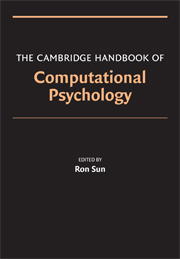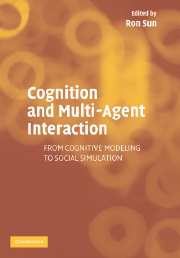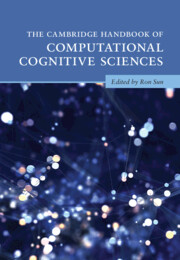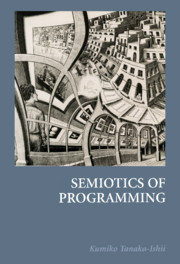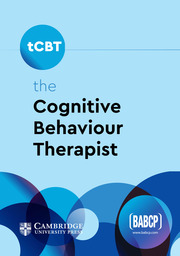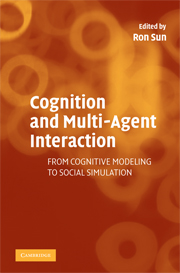The Cambridge Handbook of Computational Psychology
$68.99 (P)
Part of Cambridge Handbooks in Psychology
- Editor: Ron Sun
- Date Published: April 2008
- availability: Available
- format: Paperback
- isbn: 9780521674102
$
68.99
(P)
Paperback
Other available formats:
Hardback, eBook
Looking for an examination copy?
This title is not currently available for examination. However, if you are interested in the title for your course we can consider offering an examination copy. To register your interest please contact [email protected] providing details of the course you are teaching.
-
This book is a definitive reference source for the growing, increasingly more important, and interdisciplinary field of computational cognitive modeling, that is, computational psychology. It combines breadth of coverage with definitive statements by leading scientists in this field. Research in computational cognitive modeling explores the essence of cognition through developing detailed, process-based understanding by specifying computational mechanisms, structures, and processes. Computational models provide both conceptual clarity and precision at the same time. This book substantiates this approach through overviews and many examples.
Read more- Combines breadth of coverage with definitive statements by leading scientists in this field
- Computational models provide both conceptual clarity and precision at the same time
- Provides experts with quick overviews while also being an entry point into the field for the next generation of researchers
Reviews & endorsements
"[...] This edited volume by Sun (Rensselaer Polytechnic Institute) comprises two sections:[...] The first section will attract broader interest, especially from students, because of its juxtaposition of distinct approaches including connectionist, Bayesian, and logical modeling. The second section covers a range of topics, from memory and learning to decision making and cognitive control. [...] Given that the application chapters are largely independent of the methodological chapters, a dedicated instructor could cover more extensive ground by selecting primary papers on a desired topic. However, researchers who use computational approaches, or who want to become better consumers of computational psychology literature, may find this to be a valuable compilation of major ideas in this area. Recommended.
--S.A. Huettel, Duke University CHOICESee more reviews"--With the publication of The Cambridge Handbook of Computational Psychology, the newly emerging, interdisciplinary field of computational cognitive modeling has come of age...a cutting-edge overview of classic and current work in computational psychology. This handbook stakes out this important and promising area of cognitive science...a definitive reference source for the rapidly growing, increasingly important, and strongly interdisciplinary field of computational cognitive modeling...The Cambridge Handbook of Computational Psychology represents a milestone, marking a number of important contributions to the larger field of cognitive science."
--Howard T. Everson, PsycCRITIQUES [May 20, 2009, Vol. 54, Release 20, Article 5]Customer reviews
Not yet reviewed
Be the first to review
Review was not posted due to profanity
×Product details
- Date Published: April 2008
- format: Paperback
- isbn: 9780521674102
- length: 768 pages
- dimensions: 254 x 178 x 34 mm
- weight: 1.31kg
- availability: Available
Table of Contents
Part I. Introduction:
1. Introduction to computational cognitive modeling Ron Sun
Part II. Cognitive Modeling Paradigms:
2. Connectionist models of cognition Michael Thomas and James McClelland
3. Bayesian models of cognition Thomas Griffiths, Charles Kemp, and Joshua Tenenbaum
4. Dynamical systems approaches to cognition Gregor Schoener
5. Declarative/ logic-based computational cognitive modeling Selmer Bringsjord
6. Constraints in cognitive architectures Niels Taatgen and John Anderson
Part III. Computational Modeling of Various Cognitive Functionalities and Domains:
7. Computational models of episodic memory Kenneth Norman, Greg Detre, and Sean Polyn
8. Computational models of semantic memory Timothy Rogers
9. Models of categorization John Kruschke
10. Micro-process models of decision making Jerome Busemeyer and Joseph Johnson
11. Models of inductive reasoning Evan Heit
12. Mental logic, mental models, and simulations of human deductive reasoning Philip Johnson-Laird and Yingrui Yang
13. Computational models of skill acquisition Stellan Ohlsson
14. Computational models of implicit learning Axel Cleeremans and Zoltan Dienes
15. Computational models of attention and cognitive control Nicola De Pisapia, Grega Repov and Todd Braver
16. Computational models of developmental psychology Thomas Shultz and Sylvain Sirois
17. Computational models of psycholinguistics Nick Chater and Morten Christiansen
18. Computational models in personality and social psychology Stephen Read and Brian Monroe
19. Cognitive social simulation Ron Sun
20. Models of scientific explanation Paul Thagard and Abninder Litt
21. Cognitive modeling for cognitive engineering Wayne Gray
22. Models of animal learning and their relations to human learning Francisco Lopez and David Shanks
23. Computational modeling of visual information processing Pawan Sinha and Benjamin Balas
24. Models of motor control Ferdinando Mussa-Ivaldi and Sara Solla
Part IV. Concluding Remarks:
25. An evaluation of computational modeling in cognitive science Margaret Boden
26. Putting the pieces together again Aaron Sloman.Instructors have used or reviewed this title for the following courses
- Agent Based Modeling
- Cognitive Processes: Computational Modeling
- Computational Psychophysiology
- Technology and Human Development
Sorry, this resource is locked
Please register or sign in to request access. If you are having problems accessing these resources please email [email protected]
Register Sign in» Proceed
You are now leaving the Cambridge University Press website. Your eBook purchase and download will be completed by our partner www.ebooks.com. Please see the permission section of the www.ebooks.com catalogue page for details of the print & copy limits on our eBooks.
Continue ×Are you sure you want to delete your account?
This cannot be undone.
Thank you for your feedback which will help us improve our service.
If you requested a response, we will make sure to get back to you shortly.
×
